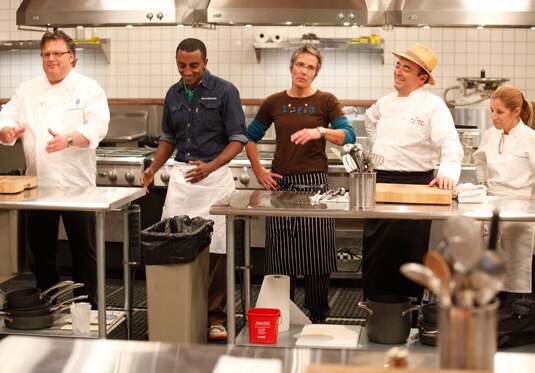Beasts of the Kitchen
Who does Jay think has the most soul? Read his thoughts on the latest challenge

Many cultures have a soul food tradition; they just don’t call it that. In France it’s the Cuisine de Grand’Mere (literally, grandma’s cooking). In Italy, they intone the name of Nona (grandma, all over again). Whatever the name it refers to food with a domestic pull and, most importantly, the visceral reach of childhood: an armed assault on the immature vascular system, by love, saturated fats and carbs. There is, however a difference between what goes on in Europe and what goes on in the US. In France and Italy there is a direct line between those homely, domestic dishes and the product of the most ambitious, gastronomic kitchens. So serious French chefs do riffs on cassoulet, pot au feu and the venerable daube. Likewise, every Michelin three star Italian restaurant will have on its menu great reworkings of classic pasta dishes.
For decades in the US the same was not true. Soul food was soul food and you didn’t screw with it; didn’t try to gussy it up or try to make it fancy. If an ambitious American chef wanted to get all haute they too headed for the comforting shores of the French or Italian. Only in very recent years have serious US restaurants started to work up riffs on milk fried chicken, biscuits and gravy, grits and lobster rolls and gumbos. And even then, with a wry and ironic nudge to the ribs.
So getting five big beasts of the kitchen – and I include wonderful Carmen in that title, even though she could win a limbo competition without bending her body – to cook soul food was always going to be interesting. On the one hand this is a cooking competition. On the other, as Marcus put it, ‘you don’t want to compete with grandma’. No, indeed, you don’t. Cos grandma can get awful cross. Which may explain why David Burke did so poorly: personally I liked his egg, with its crab, bacon and corn topping, more than the others. (It had shards of crisp bacon in it. What’s not to like?) But he appeared to have pirouetted too far away from the mother lode.
Marcus, on the other hand, hit a home run by doing soul food, but just doing it very, very well indeed. Ooh, that mac and cheese. Gosh, those collard greens. The chicken? Well, perhaps not so much, but it was still good stuff. His success with all that did raise an interesting question. If an Ethiopian born Swede, who did not grow up with this food, can do it so well, does that mean American soul food is really quite simple, or that Marcus is just a very good chef? I lean towards the latter.
And then to the main drama of the night, or Carmengate as I shall call it, being a British journalist with a taste for the cliché. We did all know that something was up. I was waiting at the set for the car to the hotel for the shoot, when another crew car pulled up and Carmen jumped out and flashed past me (I’m in the shadows of the entry bay as she charges in). Quickly we found out what had happened. That said, we weren’t entirely aware of the scale of the disaster. We didn’t know what she hadn’t been able to cook, or what had gone wrong in the kitchen. We didn’t know, when James praised the simplicity of her offering, that it was a matter of necessity. What we did know was that her stew was fantastic, and we scored accordingly. Watching the edited show, and seeing the lengths Monica went to help, I would be inhumane if I didn’t feel a twinge of compassion for her. Did she ruin her own chances, by distracting herself from the task at hand, by helping out Carmen and therefore not cooking her own shrimp properly? It’s possible. But hey, it’s a competition and there are no prizes for being a good sport.
Still, those closing frames, when Monica wept at the way things had turned out, proved one thing to me. Regardless of her food, she had more soul than the others put together.
Jay Rayner is the author of The Man Who Ate The World: In search of the perfect dinner, published by Henry Holt. Follow him on twitter @jayrayner1



